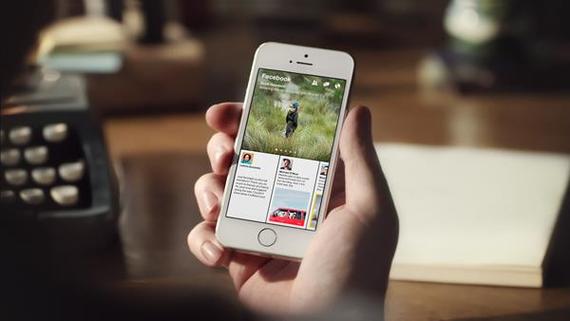
The tenth anniversary of Facebook's launch is this week, and the social juggernaut is celebrating by showing us, through their new Paper mobile app, what it wants to be in the future: a content network. It already is one, but like YouTube before it, Facebook struggles with having roots in content primarily generated by its own users.
Your interest and connection to baby photos or karaoke videos was based on your ties to the person posting them, and even then interest begins to wear thin. Still, Facebook is also a place where it's easy to post and consume content from places like Buzzfeed, the New York Times, Imgur and all the other places online that users find compelling, to the extent that Facebook is a top referrer to most publishers. In fact, Facebook's algorithm has been tweaked to give even more precedence to content that originates with top publishers, versus the latest cat meme.
The problem for Facebook is that consumers don't really see Facebook as a content hub, they see it as a place to connect with people they know. Those connections just happen to be more and more frequently through content. People bring a privacy expectation to a relationship connection tool that they don't necessarily bring to a content discovery channel, and they are less likely to want to discover new content that isn't surfaced to them directly through someone they know.
So why does Facebook care? The bottom line is naturally, the bottom line. Facebook knows that if they are to be successful as an ad platform, people have to at the very least tolerate seeing sponsored content. As it is now, they are pretty close to reaching maximum tolerance. In part this is due to marketers and agencies struggling to create sponsored content that is engaging and relevant rather than interruptive. The bar is set even higher when users are confused or annoyed by content that doesn't show up in their newsfeed via someone they know.
Yet a glance at online publishers like Forbes, Buzzfeed and even this site suggests that there is room to reset the expectation of what paid content is, and charge a premium for it, when it is framed as "native" advertising. At its best, this is sponsored content that fulfills the same expectations of quality that a user brings to the site they encounter it on. To make that model truly work on Facebook, users have to embrace content that is decoupled from friends.
With Paper, Facebook achieves this magnificently. It's a complete and elegant mobile-first re-imagining of what the Facebook experience is, with all of the features intact but revolving around showcasing rich images and videos rather than your friends. They are still there, and you can still navigate to a stunningly refashioned profile view, but they are cheek-by-jowl in the app with rich publishing streams organized by topic. It's transformative and (Facebook hopes) pulls focus away from friends talking to friends and puts it on content discovery and curation.
Discovery and curation is how Twitter has always worked. Make no mistake, Facebook has watched as Twitter has made enormous advertising inroads in the past year primarily by touting the ability to weave together paid advertising on traditional platforms like TV with sponsored content from publishers and Twitter's own Promoted Tweets and Trends. Unlike Facebook but like Paper, Twitter users expect to discover content from people they don't know and actively seek topical rather than personal connections.
The rise of mobile has enabled a larger experiment that Facebook is eagerly undertaking. Through apps they are atomizing the primary activities people turn to the platform for -- there is a Messaging app for private friend connections, Instagram is for user created rich content like photos and videos, and now Paper is there for content discovery, consumption and sharing.
The big difference is that Paper fully integrates all of Facebook's other functions as well, which leads me to believe that much of what you see from a design and function standpoint are dry runs for future updates to Facebook in mobile and possibly even desk top. You can still do everything you can do on the Facebook app, only in a much more streamlined slick way.
Of course Paper adds a whole layer of content beyond what your friends turn up, allowing you to choose from broad categories such as Headlines for straight up news, Pop Life for celebs, and intriguing ones like Exposure for beautiful photography and Equalize which tends towards empowering content for women. There is a great deal of human curation that is going into this apparently, both of the sites the content is gleaned from and the content itself. What's still not clear is whether Facebook plans to apply their algorithmic expertise to these different sections.
Right now Paper is only available for iOS and is ad free but expect both an Android version and ads to come soon. If you have an iPhone or iPad, you should definitely download it -- it's free and it could very well be what your main Facebook experience becomes as features are ported over.